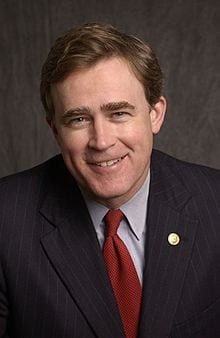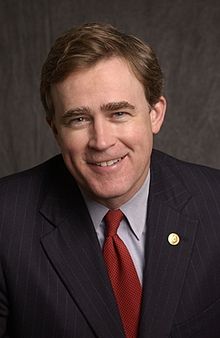State Rep. Dan Branch is asking the Texas Supreme Court to block same-sex couples legally married in other states from obtaining divorces in the Lone State State. Meanwhile, attorneys for two same-sex couples seeking divorces in Texas are arguing that under the U.S. Supreme Court’s recent decision striking down part of the federal Defense of Marriage Act, Texas’ bans on same-sex marriage are also unconstitutional.
Branch, a Republican who’s running for attorney general in 2014, filed a friend-of-the-court brief Tuesday calling for the Texas Supreme Court to overturn the 3rd Circuit appeals court’s decision upholding a divorce granted to lesbian couple Angelique Naylor and Sabina Daly in Austin in 2010. Current AG Greg Abbott intervened to challenge the divorce after it was granted, but the appeals court ruled in 2011 that Abbott did not have standing. Abbott appealed the decision to the Texas Supreme Court.
In his brief, Branch notes that he was a co-author of Texas’ 2005 constitutional amendment banning same-sex marriage. He also says he authored unsuccessful legislation in 2009 seeking to guarantee that the AG’s office’s would be permitted to defend Texas’ bans on same-sex marriage in court.
“Opponents of traditional marriage know that Texans believe strongly in the traditional institution of marriage — so Respondents cannot achieve their goals at the ballot box. They also know that they are wrong as a matter of constitutional law — so Respondents also cannot achieve their goals in this Court,” Branch writes in the brief. “Accordingly, the only way that Respondents can try to impose their vision upon the people of Texas is to trample upon both the legislative process by which Texas laws are supposed to be written, and the adversarial judicial process by which constitutional disputes are supposed to be resolved. Put simply, this lawsuit demonstrates that opponents of traditional marriage want to exclude the people of Texas from the legislative process — and then they want to exclude the legal representative of the people of Texas, the Attorney General of Texas, from the judicial process.”
Branch’s brief is the latest sign that he is veering hard to the right in his race against tea party state Sen. Ken Paxton in the 2014 Republican Primary for attorney general. Since announcing his campaign a few weeks ago, Branch has repeatedly touted his opposition to same-sex marriage and abortion, including in an ad that was mistakenly flagged by Facebook, possibly because it violated the site’s ban on hate speech.
Daniel Williams of Equality Texas, the statewide LGBT advocacy group, said Branch’s brief in the divorce case is “about Dan Branch’s political ambition, not about good government.” Two other co-authors of the marriage amendment — former state Sen. Todd Staples and former state Rep. Warren Chisum — filed a brief opposing gay divorce in 2009, but Branch didn’t sign on or file his own — until now.
“As the [appeals court] stated three years ago, and as anyone with an ounce of common sense can tell you, granting a divorce is not creating a marriage,” Williams said. “In fact the law is very clear: the ability to get a divorce is a benefit of living in Texas, not a benefit of marriage. If you don’t believe me, try being a non-resident and trying to get a divorce.”
Most states require that couples maintain residency for six months to one year before obtaining divorces. That means that if Texas refuses to allow them to divorce, gay couples who live here must relocate before ending their marriages. The case is one of two gay divorce cases pending before the Texas Supreme Court, which requested a new round of briefs following the U.S. Supreme Court’s June decisions in two same-sex marriage cases.
Also Tuesday, attorneys who represent the couples in both divorce cases, James J. Scheske and Jason Steed, filed a supplemental brief in the other case, known as In the Matter of the Marriage of J.B. and H.B. The case involves a Dallas couple that is seeking to overturn a decision from the 5th Circuit appeals court denying them a divorce.
In the brief, Scheske and Steed argue that the court can allow the couple to divorce without considering whether the state’s marriage bans are unconstitutional. However, the attorneys say that if the court does choose to consider whether the state’s marriage bans are constitutional, it should strike them down under Windsor v. United States, in which the U.S. Supreme Court ruled that the federal government must recognize same-sex marriages.
“The State argues it should not be forced to recognize out-of-state marriages that are against its public policy,” the attorneys write in the supplemental brief. “Normally this is true — but, as the Supreme Court made clear in Windsor, the State’s marriage laws are subject to constitutional guarantees. And laws that target gays and lesbians for disfavored treatment are unconstitutional.”
The Texas Supreme Court has not yet scheduled oral arguments in the two gay divorce cases.
Read Branch’s brief below.
Dan Branch Defends Marriage Before the Texas Supreme Court

















